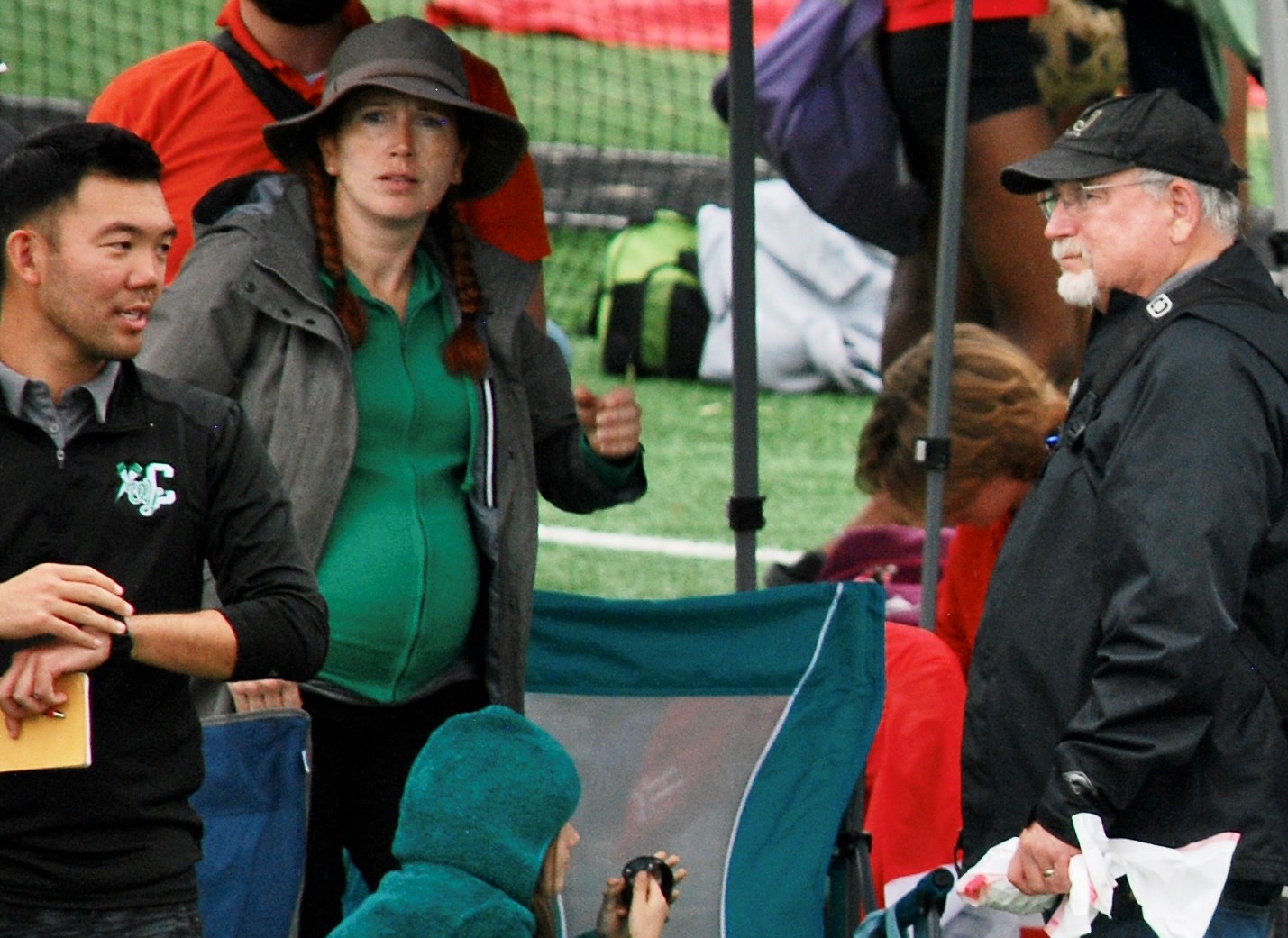
Bethesda’s Tom Kramer may not have run every single Marine Corps Marathon, but that’s only because he skipped the first one. From then on, 76-year-old Kramer has run 43 of the 44 Marine Corps Marathons, an achievement that has put his name in the Marine Corps Marathon Hall of Fame.
With 43, he moves into the lead for most Marine Corps Marathon finishes. He had been tied at 42 with Arlington’s Al Richmond, whose “Groundpounder” streak ended last year when he passed on running his 43rd. Donald Aycock of Fairbanks, Alaska and Steve Bozeman of Lynchburg have finished 42. Maureen Higgins of Perdidio Beach, Ala. leads the women with 32 finishes.
Kramer has always been athletic. For most of his life Kramer said he “had too much energy.” He turned to athletics as a way to help manage his energy. When Kramer first moved to DC in 1971, he had been a soccer player. Then in 1972, he tried playing football. His football days did not last long. During a game in a DC rec league, Kramer blew out the ACL in his left knee. From then on, he could not twist or turn, so he decided to take up running instead.
He signed up for his first marathon in 1973. “I don’t really remember [what made me want to sign up for the marathon]. I got interested in running a marathon very early on,” he said.
During his first marathon, Kramer went out too hard and by mile 17, he had to stop.
“That was the only one I didn’t finish,” he said.
Kramer does not even remember the name of the marathon, but he remembers that it was a local race in D.C. during chilly weather. His stopping point at mile 17 was somewhere along the National Mall.
When it came time for the first Marine Corps Marathon, however, Kramer skipped out. “For whatever reason, I didn’t run the first Marine Corps Marathon. I don’t know if I didn’t hear about it or if I was busy with something else.”
He did enter the race next year though. During the second Marine Corps Marathon, Kramer said that while there were a lot fewer runners back then, that did not mean it was lonely. There were still several thousand participating.
“The course has changed some,” he adds. “They used to, for example, go around the Pentagon. They used to go up Canal Road and up to McArthur Blvd. They used to go around the back of the Capitol.”
It was not Kramer’s intention to run the Marine Corps Marathon year after year, but when it occurred to him that he had done eight in a row, that was when he considered the idea of maintaining a streak.
“I don’t honestly remember [why I kept running the Marine Corps Marathon] other than I like running and it was there, so I signed up and ran,” he said. “After about eight years, I noticed I had a string going. I wasn’t even aware that I had a string going until I had already run it about eight times. And at that point, I figured, well I’ve got a string going, I’d better keep it going. It just seemed wrong to voluntarily break the string.”
All of Kramer’s running experiences are all the more impressive considering that Kramer was born with an abnormal aortic valve in his heart, which makes it difficult for him to breathe. “[My condition] has caused me to suck in air more than most people to the point where during the marathon, people often turn around and ask me if I’m okay,” he said.
The heart condition has gotten worse over the years. Kramer takes regular visits to the doctor to get it monitored by an echo-cardiogram and gets advice from his cardiologist.
“The cardiologists are all under the opinion that I aught to get my aortic valve replaced soon and I’ve really noticed the problem in the last few years, especially this year. This year, I get out of breath fairly easily,” Kramer said. “It’s getting tougher and tougher.”
His best Marine Corps Marathon time was a 3:13 in 1983. In the last few years, it’s taken him nearly twice as long to finish.
For a while, Kramer wondered if it truly was the heart condition slowing him down, or if it was merely aging. But after an encounter with a runner in a 10K, Kramer realized that it truly was his condition, not his age, that was to blame for his significant slowdown.
“[Five years ago,] there was one 10K that goes down to the C&O Canal towpath and I was coming up behind a guy and he turned around and yelled at me. I think [the breathing] just got on his nerves,” Kramer said. He eventually went on to beat that runner in the 10K by several seconds.
Kramer saw that same runner this year at the Boo Run for Life 10K. He and that runner were around the same age. Although Kramer was able to beat the man five years ago, this year, he was far slower. That was Kramer’s sign that his slowdown was not as much related to age as it was to his condition.
“My plan is to get my aortic valve replaced sometime in the next half-year and then see how it goes,” Kramer said. Though he has his mind made up, he is still very nervous about the procedure. “It’s always a very iffy thing to have your heart messed with. They might kill me off. They might turn me into a vegetable. But it might make me be able to run faster. Who knows? My hope is that I’ll be able to get back into normal running and with luck, be able to breathe more easily.”
The procedure will mean Kramer will be unable to do much for three weeks. That includes things as simple as driving or going out. After that, he will be in rehab for about another month. All in all, it will mean a couple of months without running.
Kramer hopes the procedure will mean he can continue to run in the future.
Despite his heart condition and torn ACL, Kramer runs alone these days, though he used to run with two running partners back in the 80s and 90s. He does most of his running on a wooded path by his work in Gaithersburg or along the C&O Canal Towpath.
His favorite race distance is the 10K. He does several 10Ks a year and does not like to run any shorter than that. Occasionally he will do a half-marathon and, of course, the Marine Corps Marathon.
“There are a few races that I’ve done multiple times. There’s a race at the Hebrew home of Washington that was originally called the Oy-Vey 10K, which was a wonderful name, but they eventually changed the name to the Home Run 10K, which I’ve done three or four times. And there’s a race called Boo Run for Life 10K that I’ve also run three or four times.”
For the past eight years, Kramer has been running with the Leukemia and Lymphoma Society’s Team in Training. His hope is to raise over $5,000 for leukemia and lymphoma research.
Kramer runs almost exclusively in the D.C. area and does not often travel for races. The Boston Marathon in 1974 is the only race Kramer can recall traveling a long way for. “I don’t particularly like travel except to a few special places,” he said.
Though the future is unknown for Kramer, he hopes to continue to run for as long as he is able. One thing is for sure: whether he returns for his next Marine Corps Marathon or not, he has truly made his mark on D.C.’s most prominent race.
Recent Stories
Looking for our race calendar? Click here Submit races here or shop local for running gear
Losing to Live 5K Run & Walk
WHEN Saturday, June 14, 2025 at 9:00 am WHERE This convenient location is just minutes from your house located 1/2 mile inside the 1-495 Capital Beltway at exit 51. Spectators are welcome to watch and cheer on the runners. Capital
Zebra Dazzle 5k Walk/Run or 100 Bike over 30 Days
Join the Zebras for this Zebra Dazzle event for all fitness levels. The 5k Walk/Run has 2 options. You can participate as an onsite participant on 9/13 at Carter Barron in Rock Creek Park, NW Washington DC or as a






